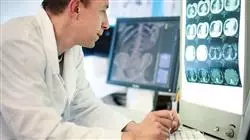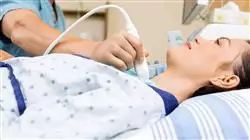University certificate
The world's largest faculty of medicine”
Introduction to the Program
The new scenarios in current Radiology push us to propose new training programs that meet the real needs of experienced professionals, so that they can incorporate the advances in the field of to their daily practice"

Medical radiology is of crucial importance in the patient's diagnostic process. The latest technological advances have allowed to deepen the knowledge of the expression that diseases have in imaging techniques. Properly interpreted radiological findings have a great impact on the health of the population, helping in early diagnosis, as a screening test, narrowing the differential diagnosis, evaluating the response to treatment and identifying complications or recurrence of a neoplastic process.
This program includes the most important areas of Radiology organized by organ systems, including aspects of daily practice, such as the importance of the radiological report and its legal implications, as well as the most frequent entities where Radiology has a fundamental role (head and neck, thorax, abdomen, musculoskeletal and women's radiology).
Additionally, the latest current topics are included, which are changing the way radiologists act, evolving from a qualitative to a quantitative Radiology, with multiparametric studies and imaging biomarkers.
You will be able to learn about the most recent advances in the field of Diagnostic Radiology, using the latest educational technology”
This Postgraduate diploma in Diagnostic Radiology contains the most complete and up-to-date scientific program on the market. The most important features include:
- Clinical cases presented by specialists in Radiodiagnostics and other specialties
- The graphic, schematic, and practical contents with which they are created, provide scientific and practical information on the disciplines that are essential for professional practice
- Real high-resolution images of pathologies, diagnostic imaging tests and guided procedures
- Presentation of practical workshops on procedures and techniques
- An algorithm-based interactive learning system for decision-making in the clinical situations presented throughout the course
- Action protocols with the most important advances in the specialty
- All of this will be complemented by theoretical lessons, questions to the expert, debate forums on controversial topics, and individual reflection assignments
- Special emphasis on test-based medicine and research methodologies in the diagnostic process
- Content that is accessible from any fixed or portable device with an Internet connection
This Postgraduate diploma is the best investment you can make when selecting a refresher program, for two reasons: in addition to updating your knowledge in Diagnostic Radiology you will obtain a qualification from TECH Global University"
The teaching staff includes a team of leading Radiologists who bring their professional experience to this program, in addition to renowned specialists in other medical areas.
The multimedia content developed with the latest educational technology will provide the physician with situated and contextual learning, i.e., a simulated environment that will provide immersive training programmed to train in real situations.
This program is designed around Problem-Based Learning, whereby the student must try to solve the different professional practice situations that arise during the course. For this reason, you will be assisted by an innovative, interactive video system created by renowned experts in the field of radiology with extensive teaching experience.
Incorporate the latest developments in Diagnostic Radiology to your medical practice and improve patient prognosis"

It includes clinical cases and real images in high definition to bring clinical practice as close as possible to the development of the program"
Why study at TECH?
TECH is the world’s largest online university. With an impressive catalog of more than 14,000 university programs available in 11 languages, it is positioned as a leader in employability, with a 99% job placement rate. In addition, it relies on an enormous faculty of more than 6,000 professors of the highest international renown.

Study at the world's largest online university and guarantee your professional success. The future starts at TECH”
The world’s best online university according to FORBES
The prestigious Forbes magazine, specialized in business and finance, has highlighted TECH as “the world's best online university” This is what they have recently stated in an article in their digital edition in which they echo the success story of this institution, “thanks to the academic offer it provides, the selection of its teaching staff, and an innovative learning method aimed at educating the professionals of the future”
A revolutionary study method, a cutting-edge faculty and a practical focus: the key to TECH's success.
The most complete study plans on the university scene
TECH offers the most complete study plans on the university scene, with syllabuses that cover fundamental concepts and, at the same time, the main scientific advances in their specific scientific areas. In addition, these programs are continuously being updated to guarantee students the academic vanguard and the most in-demand professional skills. In this way, the university's qualifications provide its graduates with a significant advantage to propel their careers to success.
TECH offers the most comprehensive and intensive study plans on the current university scene.
A world-class teaching staff
TECH's teaching staff is made up of more than 6,000 professors with the highest international recognition. Professors, researchers and top executives of multinational companies, including Isaiah Covington, performance coach of the Boston Celtics; Magda Romanska, principal investigator at Harvard MetaLAB; Ignacio Wistumba, chairman of the department of translational molecular pathology at MD Anderson Cancer Center; and D.W. Pine, creative director of TIME magazine, among others.
Internationally renowned experts, specialized in different branches of Health, Technology, Communication and Business, form part of the TECH faculty.
A unique learning method
TECH is the first university to use Relearning in all its programs. It is the best online learning methodology, accredited with international teaching quality certifications, provided by prestigious educational agencies. In addition, this disruptive educational model is complemented with the “Case Method”, thereby setting up a unique online teaching strategy. Innovative teaching resources are also implemented, including detailed videos, infographics and interactive summaries.
TECH combines Relearning and the Case Method in all its university programs to guarantee excellent theoretical and practical learning, studying whenever and wherever you want.
The world's largest online university
TECH is the world’s largest online university. We are the largest educational institution, with the best and widest online educational catalog, one hundred percent online and covering the vast majority of areas of knowledge. We offer a large selection of our own degrees and accredited online undergraduate and postgraduate degrees. In total, more than 14,000 university degrees, in eleven different languages, make us the largest educational largest in the world.
TECH has the world's most extensive catalog of academic and official programs, available in more than 11 languages.
Google Premier Partner
The American technology giant has awarded TECH the Google Google Premier Partner badge. This award, which is only available to 3% of the world's companies, highlights the efficient, flexible and tailored experience that this university provides to students. The recognition as a Google Premier Partner not only accredits the maximum rigor, performance and investment in TECH's digital infrastructures, but also places this university as one of the world's leading technology companies.
Google has positioned TECH in the top 3% of the world's most important technology companies by awarding it its Google Premier Partner badge.
The official online university of the NBA
TECH is the official online university of the NBA. Thanks to our agreement with the biggest league in basketball, we offer our students exclusive university programs, as well as a wide variety of educational resources focused on the business of the league and other areas of the sports industry. Each program is made up of a uniquely designed syllabus and features exceptional guest hosts: professionals with a distinguished sports background who will offer their expertise on the most relevant topics.
TECH has been selected by the NBA, the world's top basketball league, as its official online university.
The top-rated university by its students
Students have positioned TECH as the world's top-rated university on the main review websites, with a highest rating of 4.9 out of 5, obtained from more than 1,000 reviews. These results consolidate TECH as the benchmark university institution at an international level, reflecting the excellence and positive impact of its educational model.” reflecting the excellence and positive impact of its educational model.”
TECH is the world’s top-rated university by its students.
Leaders in employability
TECH has managed to become the leading university in employability. 99% of its students obtain jobs in the academic field they have studied, within one year of completing any of the university's programs. A similar number achieve immediate career enhancement. All this thanks to a study methodology that bases its effectiveness on the acquisition of practical skills, which are absolutely necessary for professional development.
99% of TECH graduates find a job within a year of completing their studies.
Postgraduate Certificate in Diagnostic Radiology
The medical profession requires analyzing the human body both externally and internally, to fulfill this purpose it becomes necessary to use radiology: a specialty focused on generating internal images of the body. If you are a doctor and want to reinforce your knowledge to maximize your profile, at TECH you will find a Postgraduate Certificate in Diagnostic Radiology. A high level Postgraduate Certificate focused on enhancing your skills when using tools such as X-rays, ultrasound or magnetic fields; which will allow detecting, forecasting and diagnosing diseases. Likewise, you will be a specialist in knowing the new technology and bioengineering belonging to the radiodiagnostic sector. Take this program designed with the highest academic excellence and enhance your professional profile with the best tools.
Take a Postgraduate Certificate in the largest Faculty of Medicine
At TECH we have the latest technology in online teaching software; We provide you with the necessary bases to specialize in the study of radiodiagnostic advances. During six months you will update your knowledge to acquire the best skills when working as an interventional radiologist. Get trained and learn everything related to the medical-legal aspects of radiology. You will learn about advances in neuroradiology focused on detecting pathologies such as brain malformations, hydrocephalus, oral cavity neoplasms, and spinal cord and splenic injuries. Become a highly trained Postgraduate Certificate and learn in depth about scientific progress in this area.
Specialize in the field of radiodiagnosis
Doctors who wish to strengthen their skills and deepen their knowledge in this field will find at TECH Global University the ideal option to meet their expectations. We offer you the latest academic advances created with a multidisciplinary approach, which allows us to provide professionals with the latest tools to achieve professional improvement. In this way, they will be able to specialize in knowing the multiparametric and biomarking studies of a radiological image. Likewise, they will deepen the advances in diagnostic imaging in different organs; All of this will allow reinforcing medical practice to provide the best techniques and tools when treating a patient. Additionally, they will carry out practical cases complemented with multimedia content, theoretical lessons and reflective works dictated with an online teaching methodology that is unique in the market.







